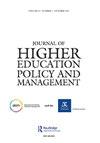Guest editors’ letter
IF 2.4
3区 教育学
Q1 EDUCATION & EDUCATIONAL RESEARCH
Journal of Higher Education Policy and Management
Pub Date : 2022-09-03
DOI:10.1080/1360080X.2022.2113082
引用次数: 0
Abstract
It has been a tumultuous period since the publication of the last Master of Tertiary Education (Management) (MTEM) special issue of student practitioner papers, not least of which is the advent of the global pandemic. Many have viewed the pandemic through the prism of ‘disruption’, as a force that has set asunder many of the old verities and has placed a higher education sector so often characterised as ‘dynamic and changing’ on a wholly new course, facing new sets of problems and opportunities. The full impact of the pandemic is yet to be known, but the works in this special issue, which were produced during the days of the pandemic and lockdowns, suggest that the challenges that have long plagued the higher education sector continue to do so. If anything, the publications in this special issue, produced by authors with both academic and professional backgrounds, located across Australia and abroad, suggest that while COVID-19 has presented new challenges and opportunities, many perennial issues remain unchanged. From academic integrity to the role of higher education in regional development; from the importance of leadership to student engagement: underlying each is an ancient and ongoing set of realities. The pace is set by Hannah Bornsztejn, who explores the effectiveness of academic integrity programs on the operation of foundation programs, which provide alternative entry to higher education with academic support to students who have not met the usual direct entry requirements. The paper provides an outline of current, dominant approaches to academic integrity in such programs, which mostly operate along a ‘punitive’ vs ‘educative’ bifurcation. The paper then provides an analysis of selected universities in the Australian state of Victoria that offer foundation programs, finding a preference for a punitive approach towards integrity. But as the author notes, an increasing prevalence of academic integrity breaches suggests a shift in approach might be warranted, one that replaces the punitive approach with one that is educative and supports students to better understand and navigate issues of academic integrity. Scholarship programs are and continue to be a feature common to universities across the globe, being present across all types and forms of universities and other institutes of higher education. But how should these programs be structured to meet an oft-purported aim: namely, as a recruitment tool for academically gifted students. Nathan Crowne considers this question through the example of an overseas campus of a large American public university, which has a scholarship program to attract the ‘best and brightest’ to its academic confines. The case study explores the effectiveness of this individual program, and in doing so, provides a guide by which other universities might judge the merits of their own efforts. The impact of COVID-19 on student engagement is explored in a paper that looks to the strategies of universities with transition and articulation students. The pandemic necessitated a shift in the way universities engage with and support these cohorts, from JOURNAL OF HIGHER EDUCATION POLICY AND MANAGEMENT 2022, VOL. 44, NO. 5, 425–427 https://doi.org/10.1080/1360080X.2022.2113082特邀编辑来信
自从上一期高等教育硕士(管理)学生从业论文特刊出版以来,这是一个动荡的时期,其中最重要的是全球大流行病的到来。许多人从“破坏”的角度看待这场大流行,认为它是一股力量,打破了许多旧的真理,并将经常被描述为“动态和变化”的高等教育部门置于全新的轨道上,面临一系列新的问题和机遇。疫情的全面影响尚不清楚,但本期特刊中的作品是在疫情和封锁期间创作的,这些作品表明,长期困扰高等教育部门的挑战仍在继续。如果有什么不同的话,本期特刊中由澳大利亚和国外具有学术和专业背景的作者撰写的出版物表明,尽管COVID-19带来了新的挑战和机遇,但许多长期存在的问题仍然没有改变。从学术诚信到高等教育在区域发展中的作用从领导力的重要性到学生参与:每一项的基础都是一套古老而持续的现实。Hannah Bornsztejn设定了步伐,她探索了学术诚信项目对基础项目运作的有效性,这些项目为没有达到通常直接入学要求的学生提供了另一种进入高等教育的学术支持。本文概述了目前在此类项目中学术诚信的主要方法,这些方法主要是沿着“惩罚性”与“教育”的分歧进行操作。然后,本文对澳大利亚维多利亚州提供基础课程的大学进行了分析,发现了对诚信的惩罚性方法的偏好。但正如作者所指出的那样,越来越普遍的学术诚信违规行为表明,可能需要改变方法,用一种具有教育意义的方法取代惩罚方法,并支持学生更好地理解和处理学术诚信问题。奖学金项目是并将继续成为全球大学的共同特征,存在于所有类型和形式的大学和其他高等教育机构中。但是,这些项目的结构应该如何达到一个经常被宣称的目标:即作为一种招募学术天赋学生的工具?内森·克朗(Nathan Crowne)以美国一所大型公立大学的海外校区为例,考虑了这个问题。该大学有一个奖学金项目,旨在吸引“最优秀、最聪明的”学生到其学术范围内学习。该案例研究探讨了这一个别项目的有效性,并在此过程中为其他大学判断自己努力的优点提供了一个指南。一篇论文探讨了COVID-19对学生参与度的影响,该论文着眼于拥有过渡和衔接学生的大学的策略。《高等教育政策与管理杂志》(JOURNAL OF HIGHER EDUCATION POLICY and MANAGEMENT 2022, VOL. 44, NO. 11)称,疫情迫使大学改变与这些群体接触和支持的方式。5,425 - 427 https://doi.org/10.1080/1360080X.2022.2113082
本文章由计算机程序翻译,如有差异,请以英文原文为准。
求助全文
约1分钟内获得全文
求助全文
来源期刊

Journal of Higher Education Policy and Management
EDUCATION & EDUCATIONAL RESEARCH-
CiteScore
5.30
自引率
7.70%
发文量
52
期刊介绍:
The Journal of Higher Education Policy and Management is an international journal of professional experience and ideas in post-secondary education. It is a must read for those seeking to influence educational policy making. The journal also aims to be of use to managers and senior academic staff who seek to place their work and interests in a broad context and influence educational policy and practice.
 求助内容:
求助内容: 应助结果提醒方式:
应助结果提醒方式:


